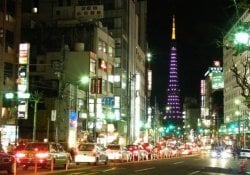The Portuguese arrived in Japan around 1542-1543, being the first Europeans to establish a continuous and direct flow of trade between Japan and Europe. This also influenced the Japanese language, since several products arrived in Japan during that time through the Portuguese.
Over the years, it has been speculated that more than 4,000 Japanese words were influenced by the Portuguese language and the Portuguese. In this article we will see a list of some of these words.
| Romaji | Kana / Kanji | Português Arcaico | Português Moderno |
|---|---|---|---|
| arukōru | アルコール | álcools | álcool |
| bateren | 伴天連 / 破天連 | padre | padre |
| bīdama | ビー玉 | vi(dro) + 玉 (dama = "bola") | berlinde, bola-de-gude |
| biidoro | ビードロ | vidro | vidro |
| birōdo | ビロード ou 天鵞絨 | veludo | veludo |
| bouro/bouru | ボーロボール | bolo | bolo, bola |
| botan | ボタン釦 / 鈕 | botão | botão |
| buranko | ブランコ | balanço | balanço, baloiço |
| charumera/charumeru | チャルメラ / 哨吶 | charamela | charamela |
| chokki | チョッキ | jaque | jaqueta, colete |
| furasuko | フラスコ | frasco | frasco |
| iesu | イエス | Jesu | Jesus |
| igirisu | イギリス / 英吉利 | inglez | inglês |
| iruman | イルマン / 入満 / 伊留満 / 由婁漫 | irmão | irmão |
| jouro | じょうろ / 如雨露 | jarro | jarro |
| juban/jiban | じゅばん / 襦袢 | gibão | camiseta, camisete |
| kanakin/kanekin | 金巾 / ▽かなきん / ▽かねきん | canequim | canequim |
| kantera/kandeya | カンテラ / カンデヤ | candeia, candela | candeia |
| kapitan | 甲比丹 / 甲必丹 | capitão | capitão |
| kappa | 合羽 | capa | capa impermeável |
| karuta | かるた / 歌留多 / 加留多 / 骨牌 | cartas | cartas de jogar |
| kasutera, kasuteera,kasuteira | カステラ | castella | pão-de-ló |
| kirishitan | キリシタン / 切支丹 / 吉利支丹 | christão | cristão |
| kirisuto | キリスト or 基督 | Christo | Cristo |
| kompeitō | 金米糖 / 金平糖 / 金餅糖 | confeito | confete |
| koppu | コップ | copo | copo |
| kurusu | クルス | cruz | cruz |
| marumero | 木瓜 or マルメロ | marmelo | marmelo |
| meriyasu | メリヤス / 莫大小 / 目利安 | meias | meias |
| miira | ミイラ / 木乃伊 | mirra | mirra |
| oranda | オランダ / 和蘭(陀) / 阿蘭陀 | Hollanda | Holanda |
| pan | パン / 麺麭 / 麪包 | pão | pão |
| pandoro | パンドロ | Pão-de-ló | pão-de-ló |
| rasha | 羅紗 | raxa | sarja |
| rozario | ロザリオ | rosario | Rosário |
| sabato | サバト | sábado | sábado |
| sarasa | 更紗 | saraça | morim |
| shabon | シャボン | sabão | sabão |
| shabondama | シャボン玉 | sabão + 玉 (dama = bola) | bola de sabão |
| shōro | ショーロ | choro | choro |
| shurasuko | シュラスコ | churrasco | churrasco |
| subeta | すべた / スベタ | espada | espada |
| tabako | 煙草 / 莨 | tabaco | tabaco |
| tempura | 天麩羅 / 天婦羅 | Têmporas | Têmporas |
| zabon | 朱欒 / 香欒 | zamboa | toranja |
Índice de Conteúdo
Curiosities
Below are some more terms of Portuguese origin (or not) that have gained prominence in the Japanese language:
Tempura – The Temples were days of religious fasting in which Portuguese Catholics did not eat meat and fried vegetables and fish in breaded dishes, foods that were normally eaten raw or cooked by the Japanese.
Iruman – Term used at the beginning of the Christianization of Japan to identify the missionary before becoming a priest.
Thank you
Arigato is not of Portuguese origin as some people think. In fact, "arigato" is the modern form of "arigatashi" from archaic Japanese, which consists of the agglutination of "Ari" from the verb "Aru" (to be, to exist) and "Katashi" an adjective that means difficulty. I.e, I have a hard time expressing my gratitude.
The Ne of Portuguese x Ne of Japanese
This word is used to emphasize what has just been said. In Portuguese, "né" also has the same function, being a contraction of the phrase "Não é?". However, it is very likely that this is a coincidence.
To learn more, we recommend reading: What does ne [ね] mean in Japanese language
I plan to add to this list soon. If you find any important words missing, or any errors, please leave a comment.





